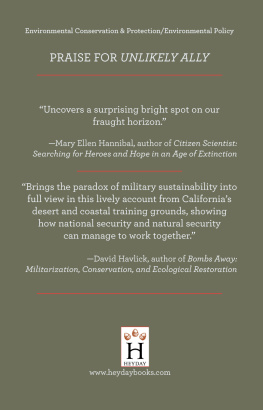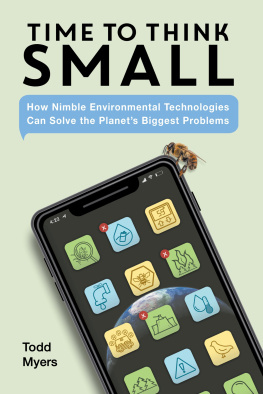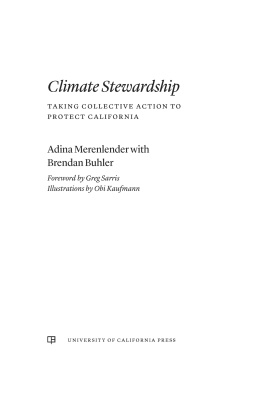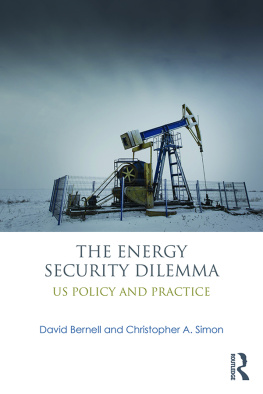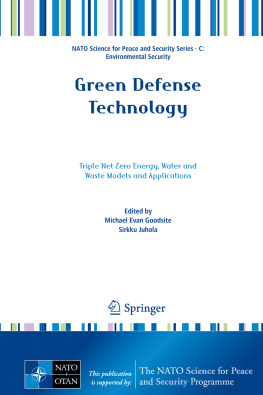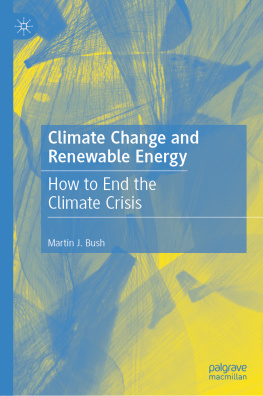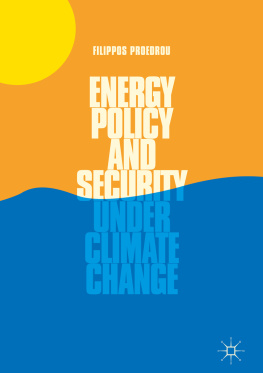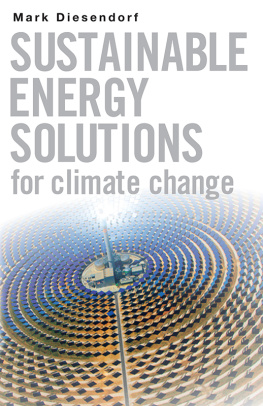Contents
Guide


Copyright 2018 by Marilyn Berlin Snell
The publisher wishes to thank the following organizations and individuals for their generous contributions to this project: The Nature Conservancy, the California Wildlife Foundation, Tim Disney, the Roy & Patricia Disney Family Foundation, and the Endangered Habitats League.
Excerpt from Foggy Perspective 2018 by Robert Thielen.
Reprinted by permission of the author.
All rights reserved. No portion of this work may be reproduced or transmitted in any form or by any means, electronic or mechanical, including photocopying and recording, or by any information storage or retrieval system, without permission in writing from Heyday.
Library of Congress Cataloging-in-Publication Data
Names: Snell, Marilyn Berlin, author.
Title: Unlikely ally: how the military fights climate change and protects the environment / Marilyn Berlin Snell.
Other titles: How the military fights climate change and protects the environment
Description: Berkeley, California: Heyday, [2018] | Includes bibliographical references.
Identifiers: LCCN 2018009692 (print) | LCCN 2018013644 (ebook) | ISBN 9781597144612 (e-pub) | ISBN 9781597144063 (hardcover: alk. paper)
Subjects: LCSH: Military bases--California--Environmental aspects. | Environmental protection--California--Case studies. | Wildlife conservation--California--Case studies. | Renewable energy sources--California--Case studies. | Climate change mitigation--United States--Case studies. | Environmental responsibility--United States--Case studies. | California--Environmental conditions.
Classification: LCC TD195.A75 (ebook) | LCC TD195.A75 S67 2018 (print) | DDC 363.738/760973--dc23
LC record available at https://lccn.loc.gov/2018009692
Cover Photo: Melnotee/Istock/Thinkstock
Book Design: Ashley Ingram
Map: David Deis
Orders, inquiries, and correspondence should be addressed to:
Heyday
P.O. Box 9145, Berkeley, CA 94709
(510) 549-3564
www.heydaybooks.com
10 9 8 7 6 5 4 3 2 1
For R and Al
and for Gregory
CONTENTS
PREFACE
PLAYING POWER GAMES WITH A THREAT MULTIPLIER
September 8, 2011, dawned warm across the American Southwestnothing new for the regionbut by 1:57 p.m. it was 115 degrees in Californias Imperial Valley, much hotter than normal for that time of year. Utility companies in these parts consider September a shoulder season, when customer demands for energy are lower than in peak summer months, and often schedule transmission-maintenance outages. Several important transmission lines were down for repair that particular September day. When a crush of air conditioners powered up across the Imperial Valley and electricity demand spiked, the regions chief grid and transmission operator for the territory, Arizona Public Service, saw the danger signs in real time. At its North Gila substation, a critical and automatic safety measure kicked in for devices called series capacitors, which were bypassed in order to optimize the voltage on the utilitys transmission line.
An experienced substation technician was dispatched to the North Gila site to perform whats called switching to isolate the capacitors. He was to execute eleven crucial steps that had to be done in exact order. It was high stress, and he was both on the phone with the APS system operator (required company protocol for switching) and distracted by a maintenance crew he was trying to give instructions to. He missed two steps.
At 3:27 p.m. the massive transmission line that runs through the North Gila substation and carries electricity from Arizona to the Imperial Valley; Northern Baja, Mexico; and San Diego went down. About ten minutes later, residents in Yuma, Arizona, began to lose power. From there the blackout cascaded south and west, affecting more than five million people, some for up to twelve hours. All of the San Diego area lost power. According to a report by the Federal Energy Regulatory Commission: The blackout happened near rush hour, on a business day, snarling traffic for hours. Schools and businesses closed, some flights and public transportation were disrupted, water and sewage pumping stations lost power. Marine Corps Air Station Miramar went down. So did Marine Corps Base Camp Pendleton in northern San Diego County.
The day it happened, Major General Anthony (Tony) Jackson was just two months shy of retirement after serving thirtysix years in the Marine Corps. As commanding general of Marine Corps Installations West, based at Camp Pendleton, he was the man in charge when the power went out. His command center was equipped with emergency power, and when the blackout rolled over Camp Pendleton some of his diesel generators kicked on for base headquarters. That was the one good thing that happened that day, Jackson said.
Jackson immediately put his base on high alert. My HQ never lost communications within my command, but power was cut to our housing and the other facilities. We had ramifications for water supply. Power was not fully restored to the base until 4:30 a.m.
When the electrical grid goes downwhether compromised by human error, antiquated infrastructure, natural disaster, or cyberattackthe cascading negative consequences can be profound, as those who experienced the 2011 blackout discovered. To put the need for grid security starkly, as did the authors of a 2017 paper for the Truman Center, a nationwide membership organization of veterans, policy analysts, and political advisors created in the aftermath of 9/11 to reconceptualize national security in the twenty-first century, the failure of the electrical grid can be seen as the single point of failure to the American way of life.
Jackson understood the broader implications of being dependent on a power grid he had no control over. If you lose communication with your satellites, if you dont have the Internet, youre in trouble and its all interrelated with energy policy, he said. We need to be self-sufficient so we can do the business of national security.
Diesel generators kept Jacksons HQ lit and connected during the massive electricity-system failure. But he didnt want to depend on fossil fuels for backup going forward. He wanted the US militarythe worlds largest single petroleum buyerto wean itself from its dependence on fossil fuels. This was by no means a radical idea: The federal law that set the Defense Department goal to procure or produce no less than 25 percent renewable energy for its facilities by 2025 was signed by President George W. Bush in 2007. After leading the initial campaigns in Afghanistan and Iraq in the early days of those wars, General James Mattisnow Donald Trumps secretary of defensecalled on the Defense Department to unleash us from the tether of fuel. The Marine Corps alone was consuming in excess of 200,000 gallons of fuel per day in Afghanistan during the height of that war. Mattiss comments came as the army was losing an average of two soldiers for every fifty fuel-supply convoys.
It was during the war in Afghanistan that there was a very clear recognition that the fuel-supply lines were leading to a huge number of deaths and injuries, and that the nexus between security and energy was very real, a former Pentagon official working on energy initiatives told me.

